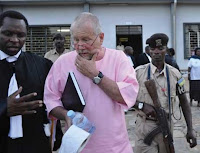Rwanda: Mosquitoes, Noise and Hillary Clinton cited in Peter Erlinder defense
By Adam Hooper
Rwanda News Agency
14 June 2010
Kigali: Citing depression, attempted suicide, a previously-unreported hospital visit and poor health, American law professor and accused Tutsi Genocide denier Peter Erlinder recanted all his publications in a desperate appeal for bail Monday in the High Court.
“I do want to clear my name, but I want to clear my name in a way that allows me to be healthy, that allows me to be mentally clear, that allows me to respond in ways that I will not be able to respond if I don't get the medical treatment that I need now,” he said in the Nyamirambo High Court.
Erlinder was wearing pink prison robes and a short haircut, both new since his public appearance last Monday when he was denied bail. He was arrested 17 days ago in Kigali for allegedly denying the 1994 Tutsi Genocide.
Since then, Rwandan media had only announced two hospital visits. The first was on May 31, when Erlinder experienced what he described in court today as a panic attack caused from stress and high blood pressure, which felt to him like a heart attack.
His second trip to hospital was the morning of June 02, when police found him partly unconscious in his cell. Even Kennedy Ogetto, one of Erlinder's Kenyan lawyers, told BBC Kinyarwanda the next day he could not confirm the news as had not been able to consult with his client.
“Your honour, I lost all hope to live,” Erlinder revealed in today's nine-hour court session. “That is the product of the depression I've been struggling with for 25 years.”
The third hospital visit, unreported until now, happened after Erlinder was denied bail last week.
“On the Monday of the court proceedings a week ago I couldn't hear what was going on in court,” he explained to Judge Johnson Busingye. “In the detention facility ... it simply is noisy. In addition, there are no screens and no mosquito nets and I was sleeping on the floor for more than a week without a blanket. In order to try and get some sleep, I tried to use what I could to block out the noise and prevent mosquitoes from getting into my ears.”
Erlinder said he put tissue papers and cotton into his ears, but he pushed them in too far and couldn't remove them until prison staff brought him to King Faisal hospital two days later. He said the problem is now solved for good, as the American embassy, which already supplies him with food, brought him plastic earplugs.
While Erlinder and his lawyers appealed to the judge that he should be released on humanitarian grounds until the Genocide denial hearing begins, the prosecution rebutted, calling him “incorrigible.”
“Releasing him would be sad and tantamount to granting him a blank cheque to continue denying that over one million innocent Rwandan Tutsi citizens of this country were butchered in a grand and organized Genocide not seen anywhere on Earth before 1994,” prosecutor Jean Bosco Mutangana, told the judge.
Erlinder prepares a response while prosecutor Jean Bosco Mutangana explains why he should be denied bail.
Erlinder, 62, is a professor at William Mitchell College of Law in St. Paul, Minneapolis in the United States and he works as lead defence counsel at the International Criminal Tribunal for Rwanda (ICTR).
His defence has led to the acquittal of top Genocide suspects, and he recently filed a suit against President Paul Kagame in America on behalf of the widows of dead Rwandan president Juvenal Habyarimana and Burundian counterpart Cyprien Ntaryamira. Erlinder alleges that President Kagame, Rwanda's current leader, is responsible for the assassinations which sparked the 100-day Tutsi Genocide.
Erlinder's defence team handed the judge documents, forwarded by United States secretary of state Hillary Clinton, from three American medical clinics outlining his health conditions and recommending he return to the United States for medical monitoring.
“You also had my recantation,” Erlinder concluded to a silent courthouse. “Since the court has my admissions of recantation and mental illness, I'm not sure what value it would be to have me come back, but I'm pleased to come back.”
“If for some reason I were to misrepresent this to the court here, the court could seek my dismissal from the ICTR and disciplinary proceedings back in the United States.”
The court session started at 8:45am (0645GMT), but there had to be an immediate hour adjournment as Erlinder said the prosecution had not granted him timely access to crucial documents. Court went into recess again for lunch after four hours of presenting submissions.
The afternoon session dragged four more hours as Erlinder pleaded to be released and the prosecutor Mutangana demanded he be maintained in jail for 30 days as the state prepares his charge sheet.
The high court judge will decide whether to grant bail to the controversial lawyer on Thursday at 3 p.m. in Kigali.
Erlinder makes his case before High Court Judge Johnson Busingye.



0 Comments:
Post a Comment
Subscribe to Post Comments [Atom]
<< Home